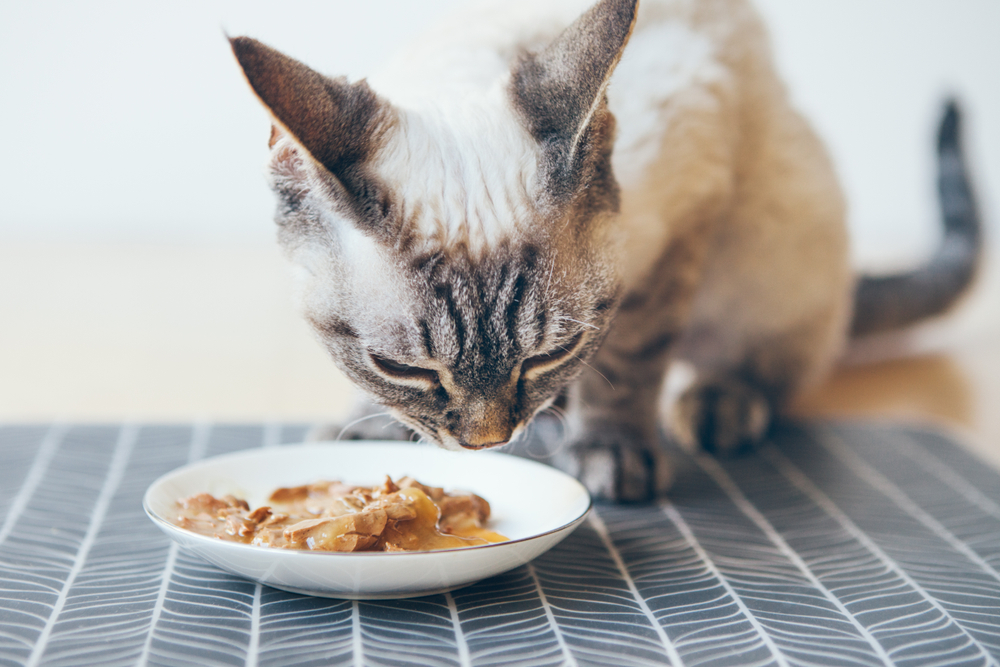Crummy Tummy: Cat Food Allergies

Like humans and dogs, cats can suffer from a number of different allergies, including those relating to their diet. Cat food allergies are a common concern among feline owners who wonder if their cat’s symptoms are due to what they eat. If your cat is having symptoms that include itching, digestive upset, or even sneezing, they may be allergic to ingredients in their food.
Oakland Veterinary Referral Services explores cat food allergies, symptoms to look for, and how to help your favorite kitty through effective allergy treatment.
Cat Food Allergy Symptoms
Cat food allergies often go unnoticed because the symptoms don’t seem to point to what most cat owners think of as dietary issues from ingredients in their diet. Among the allergies faced by felines, more than 15% are as a result of their food. Many owners think that their cat just has a cold or a seasonal allergy. Instead, it may be a food allergy.
Food allergies in cats can be difficult to diagnose because you must use the process of ingredient elimination to reach an accurate conclusion.
Cats with food allergies generally display some of the following allergic reactions.
- Skin inflammation (rash, sores)
- Increased scratching or biting of skin
- Diarrhea, vomiting, difficult bowel movements
- Fur loss or dull, brittle fur
- Skin and ear infections
- Discharge from the eyes and/or nose
- Sneezing, wheezing or coughing
If your cat is experiencing these symptoms, schedule an appointment with your veterinarian.
Why Would My Cat Develop a Food Allergy?
An allergy occurs when a substance triggers an overreaction of the immune system. With cat food allergies, a foodborne ingredient leads to symptoms because the immune system thinks the food is an attack on the body.
A cat food allergy is an allergic reaction to one or more ingredients. The most common foods associated with allergies in cats are proteins: chicken, beef, dairy products and fish.
A cat can develop an allergy in reaction to a food they’ve eaten at any age. Onset can be at 8-12 weeks, greater than 10 years old, or anywhere in between. Veterinary science can’t yet completely explain why some cats develop allergic reactions to certain foods while others do not. And why they have an allergic reaction to a food that they were previously okay to eat.
One important factor is genetic predisposition. Some cats are genetically more likely to develop allergies. Cats with a genetic predisposition to allergies are likely to have a higher likelihood of developing either food and inhalant allergies (atopy) or both.
Diagnosing and Treating a Cat Food Allergy
Cats vary in their level of reaction to food allergens. A cat’s allergy flare-up may be mild or severe and the correct treatment can depend upon the cat’s reaction level.
Diagnosing and treating cat food allergies involves an examination, exclusion of other possible causes, and dietary elimination trials. Trials are carried out over several weeks to determine which ingredients are causing the flare-ups. During a dietary elimination trial, your cat must only eat the food or foods recommended by your veterinarian.
If your cat’s allergy symptoms subside during the food trial, the next step is to re-introduce a food your cat was eating when having symptoms. If symptoms return within a week of starting the food challenge, that confirms the presence of a food allergy. If your cat was eating a variety of proteins, you can perform a challenge for each one to determine exactly which proteins are causing a reaction.
Food allergies cannot be cured but they can be managed. Many cats with food allergy can remain in remission long-term with just dietary management. Ask your veterinarian for a recommendation of what foods to avoid and the best diet for your cat.
If you would like more information on cat food allergies, please contact our team. We are happy to discuss options for diagnosis and treatment.


